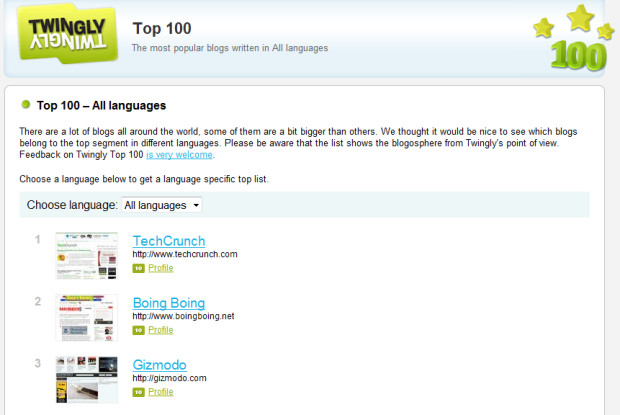 Twingly, the social blog search engine that prides itself in being completely spam-free, has launched BlogRank as a way to identify the 100 most important blogs in 12 different languages based on a proprietary ranking system. It’s very similar to what Technorati has been trying to achieve with their Authority ranking, i.e. creating a Google PageRank for blogs.
Twingly, the social blog search engine that prides itself in being completely spam-free, has launched BlogRank as a way to identify the 100 most important blogs in 12 different languages based on a proprietary ranking system. It’s very similar to what Technorati has been trying to achieve with their Authority ranking, i.e. creating a Google PageRank for blogs.
The biggest difference is that Twingly breaks down the most popular blogs by language, which they claim is worth much more for local blogs than competing with others at an international level. I tend to agree with that. It’s rather similar to what Wikio is doing (disclosure: TechCrunch France writer Ouriel Ohayon is on Wikio’s board).
To demonstrate the technology, Twingly is debuting its Top 100 today, taking another page from Technorati in that regard. We may be a little biased, but we like Twingly’s Top 100 better because we came out on top across all languages tracked (we also lead the English-language blog ranking). In all seriousness, the top 100 lists from Technorati and Twingly look very alike, although The Huffington Post (which is the most popular blog according to Technorati) isn’t even listed at Twingly’s. The startup says this has to do with the fact that they’re more focused on Europe right now, and that they’ve simply never bothered to ping the service anyway.
You can find out who leads the top 100 per tracked language (12 so far) in Twingly’s blog post announcing the new feature.
Sweden-based Twingly, not to be confused with Twing, doesn’t share much about the underlying technology and only says its ranking system focuses on ‘inlinks and likes among other things’. They also stress that it shows the blogosphere according to their data, and that it’s not necessarily 100% accurate. It’s a nice feature, but late in the game, and you’ve got to ask yourself how obsolete both Twingly’s and Technorati’s ranking would be if Google were actually the next to introduce the next ‘Google PageRank for blogs’.
